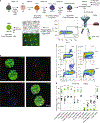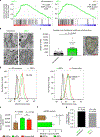Recapitulating endocrine cell clustering in culture promotes maturation of human stem-cell-derived β cells
- PMID: 30710150
- PMCID: PMC6746427
- DOI: 10.1038/s41556-018-0271-4
Recapitulating endocrine cell clustering in culture promotes maturation of human stem-cell-derived β cells
Erratum in
-
Author Correction: Recapitulating endocrine cell clustering in culture promotes maturation of human stem-cell-derived β cells.Nat Cell Biol. 2019 Jun;21(6):792. doi: 10.1038/s41556-019-0316-3. Nat Cell Biol. 2019. PMID: 30914825
Abstract
Despite advances in the differentiation of insulin-producing cells from human embryonic stem cells, the generation of mature functional β cells in vitro has remained elusive. To accomplish this goal, we have developed cell culture conditions to closely mimic events occurring during pancreatic islet organogenesis and β cell maturation. In particular, we have focused on recapitulating endocrine cell clustering by isolating and reaggregating immature β-like cells to form islet-sized enriched β-clusters (eBCs). eBCs display physiological properties analogous to primary human β cells, including robust dynamic insulin secretion, increased calcium signalling in response to secretagogues, and improved mitochondrial energization. Notably, endocrine cell clustering induces metabolic maturation by driving mitochondrial oxidative respiration, a process central to stimulus-secretion coupling in mature β cells. eBCs display glucose-stimulated insulin secretion as early as three days after transplantation in mice. In summary, replicating aspects of endocrine cell clustering permits the generation of stem-cell-derived β cells that resemble their endogenous counterparts.
Figures







Comment in
-
Improving human β-cell maturation in vitro.Nat Cell Biol. 2019 Feb;21(2):119-121. doi: 10.1038/s41556-019-0277-6. Nat Cell Biol. 2019. PMID: 30710149 No abstract available.
References
-
- Rezania A et al. Reversal of diabetes with insulin-producing cells derived in vitro from human pluripotent stem cells. Nat. Biotech. 32, 1121–1133 (2014). - PubMed
Publication types
MeSH terms
Substances
Grants and funding
LinkOut - more resources
Full Text Sources
Other Literature Sources
Molecular Biology Databases

